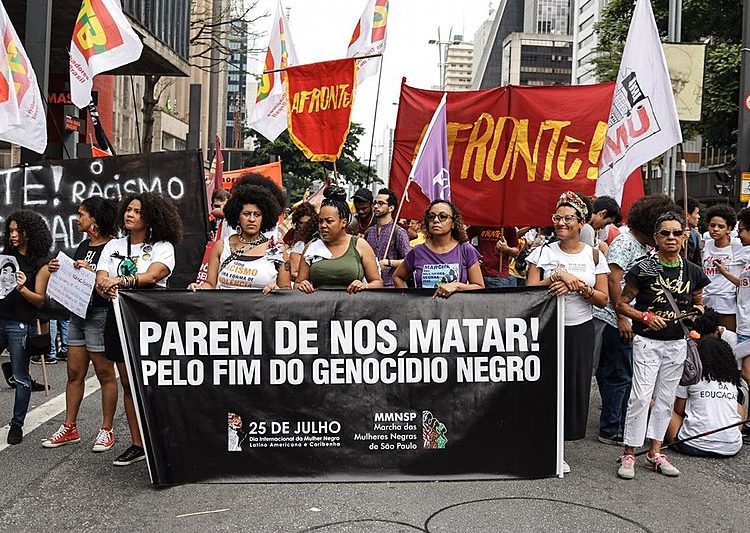Black Awareness Day is celebrated in Brazil this Wednesday, Nov. 20, in honor of Zumbi, one of the most important quilombola leaders in Brazilian history and a pioneer of resistance to slavery of Africans in the Latin American country. To mark the day, demonstrations were held in several cities to call for black people’s rights.
In São Paulo, the 16th Black Awareness March took to the center of the city as demonstrators marched to the Theatro Municipal, a historical site where the Unified Black Movement (MNU) was created in 1978, during the military dictatorship.
The motto of this year’s march is “life, freedom, and future, against black genocide.” One of the organizers, the MNU activist Simone Nascimento said that the demonstration’s perspective is to assert a new project for society.
“A society with equal rights and opportunities for black people, who have been the victims of a genocidal process,” she explained.
Flavio Jorge, from the national board of the National Coordination of Black Organizations (Conen), pointed out how important it is to hold a demonstration like this one amid the rise of conservatism in the country.
“This is the first march we hold during a far-right government. This government — and we knew that — will make life much more difficult for black people,” Jorge pointed out, adding that the unity between the organizations involved in the march shows a way for the movement to face this moment.
“There is no way you can feel safe in this political situation. We are vulnerable for a number of reasons,” nurse Alva Helena said, as she joined the march, underscoring that black genocide in Brazil is the result of a slave process that was never completely abolished.
“We were not really freed. This is why this march is important, to show society that we are still unhappy with inequality and injustices that the State promotes due to this unfinished abolition,” she argued.
Other cities
Other cities in São Paulo state also had marches, including Campinas, Jundiaí, and Santos.
In Rio de Janeiro, demonstrators gathered on Wednesday morning for the 8th March of the Outskirts of Rio de Janeiro. The organizers released a manifesto denouncing black and indigenous genocide and the policies implemented by the Jair Bolsonaro government, including the pension reform, which are harmful to the lives of black and poor Brazilians, as protesters argue.
In Florianópolis, southern Brazil, black activists marched in the center of the city to celebrate the struggle of Zumbi; the Afro-Brazilian warrior Dandara, who lived in colonial times; councilwoman Marielle Franco; and other major names in the struggle against racism in the country.
In Belo Horizonte, southeastern Brazil, the day dawned as protesters chanted watchwords during the 3rd March for Racial Equality. The official manifesto disclosed by the organizers points out the importance of black people and Afro-Brazilian culture in forging the cultural identity in the city.
In the afternoon, two major demonstrations took place in the Northeast. In the city of Recife, more than 50 organizations came together for a protest against racism and black genocide and for the right to life.

A demonstrator waves the rainbow flag during the Black Awareness March in Recife | PH Reinaux/@articulacaonegrape
In Salvador, the 40th Black Awareness March paid tribute to Mumia Abu-Jamal, a former Black Panther activist who was incarcerated and sentenced to death in the United States. The demonstration also celebrated black revolutionaries who fought against the slave regime in Brazil and the world.
*With reports by José Eduardo Bernardes and the web portal Alma Preta.




